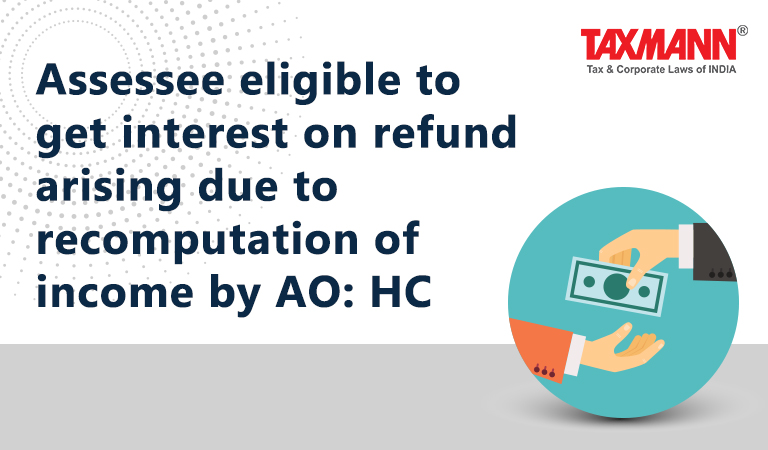Assessee eligible to get interest on refund arising due to recomputation of income by AO: HC
- Blog|News|Income Tax|
- 3 Min Read
- By Taxmann
- |
- Last Updated on 24 November, 2022

Case Details: PCIT v. Punjab & Sind Bank - [2022] 145 taxmann.com 31 (Delhi)
Judiciary and Counsel Details
-
- Manmohan & Ms Manmeet Pritam Singh Arora, JJ.
- Kunal Sharma, Sr. Standing Counsel & Shrey Nargotra, Adv. for the Appellant.
- Sumit Lalchandani & Tarun Chanana, Advs. for the Respondent.
Facts of the Case
Assessee-Bank filed its return of income for the relevant assessment year. During the assessment, Assessing Officer (AO) raised demand by increasing the total income of the assessee. The said demand was paid by the assessee along with interest under sections 220 and 234D.
However, upon subsequent recomputation of the income, the income of the assessee was reduced after setting off brought forward losses. Due to the reduction of total income, the demand was found incorrect and the assessee was entitled to get a refund of the sum deposited as interest.
The assessee contended that interest on the refund under section 244A was not granted on such refund and consequently filed an appeal before CIT(A). The CIT (A) dismissed the appeal on the ground that the interest demanded constitutes “interest on interest”.
However, the Tribunal allowed the assessee’s request. The matter reached the Delhi High Court.
High Court Held
The High Court held that the contention of the revenue to consider the interest demanded by the assessee as “interest on interest” is factually incorrect. The amount refunded to the assessee does not bear the character of interest in the hands of the assessee as defined under section 2(28A).
Section 2(28A) states that interest is referred to as interest for the money borrowed or debt incurred and any service fees in respect of such money borrowed or debt incurred. Therefore, the amount in the hands of the assessee cannot be considered as interest but as a debt owed to it by the revenue. Thus, the assessee is demanding interest on such debt and not interest on interest.
The right to interest follows whenever money has been received by a party is to be refunded. Since there is no specific provision for payment of interest on the amount of excess tax collected by revenue, the government cannot waive off its apparent obligation to reimburse the monies along with interest for the period of undue retention.
Accordingly, the assessee’s appeal was allowed and it was entitled to the interest amount due on the amount for the retention period.
List of Cases Reviewed
-
- Order passed by ITAT – Delhi in IT Appeal No. 5486/Delhi/2014, dated 29-6-2018 (para 24) affirmed.
- Preeti N. Aggarwala v. Chief CIT [2017] 82 taxmann.com 155/248 Taxman 261/394 ITR 557/295 CTR 349 (Delhi) (para 23) followed.
List of Cases Referred to
-
- CIT v. Gujarat Fluoro Chemicals [2014] 42 taxmann.com 1/222 Taxman 349/[2013] 358 ITR 291/262 CTR 269 (SC) (para 4)
- Preeti N. Aggarwala v. Chief CIT [2017] 82 taxmann.com 155/248 Taxman 261/394 ITR 557/295 CTR 349 (Delhi) (para 4)
- Asstt CIT v. Alembic Glass Industries Ltd. [2008] 111 ITD 320 (Ahd.) (para 4)
- Sutlej Industries Ltd. v. CIT [2016] 67 taxmann.com 76 (Delhi) (para 5)
- Universal Cables Ltd. v. CIT [2020] 113 taxmann.com 353/420 ITR 111 (SC) (para 7)
- Stock Holding Corpn. of India Ltd. v. N.C. Tewari, Commissioner of Income-tax [2015] 53 taxmann.com 106/229 Taxman 512/373 ITR 282/274 CTR 16 (Delhi) (para 8)
- CIT v. Sutlej Industries Ltd. [2010] 190 Taxman 136/325 ITR 331/231 CTR 280 (Delhi) (para 8)
- CIT v. Engineers Ltd. [2015] 55 taxmann.com 1/232 Taxman 287/373 ITR 377/275 CTR 354 (Delhi) (Mag.) (para 9)
- Union of India v. Tata Chemicals Ltd. [2014] 43 taxmann.com 240/222 Taxman 225 (Mag.)/363 ITR 658 (SC)/[2014] 6 SCC 335 (para 20).
Disclaimer: The content/information published on the website is only for general information of the user and shall not be construed as legal advice. While the Taxmann has exercised reasonable efforts to ensure the veracity of information/content published, Taxmann shall be under no liability in any manner whatsoever for incorrect information, if any.

Taxmann Publications has a dedicated in-house Research & Editorial Team. This team consists of a team of Chartered Accountants, Company Secretaries, and Lawyers. This team works under the guidance and supervision of editor-in-chief Mr Rakesh Bhargava.
The Research and Editorial Team is responsible for developing reliable and accurate content for the readers. The team follows the six-sigma approach to achieve the benchmark of zero error in its publications and research platforms. The team ensures that the following publication guidelines are thoroughly followed while developing the content:
- The statutory material is obtained only from the authorized and reliable sources
- All the latest developments in the judicial and legislative fields are covered
- Prepare the analytical write-ups on current, controversial, and important issues to help the readers to understand the concept and its implications
- Every content published by Taxmann is complete, accurate and lucid
- All evidence-based statements are supported with proper reference to Section, Circular No., Notification No. or citations
- The golden rules of grammar, style and consistency are thoroughly followed
- Font and size that’s easy to read and remain consistent across all imprint and digital publications are applied



 CA | CS | CMA
CA | CS | CMA
